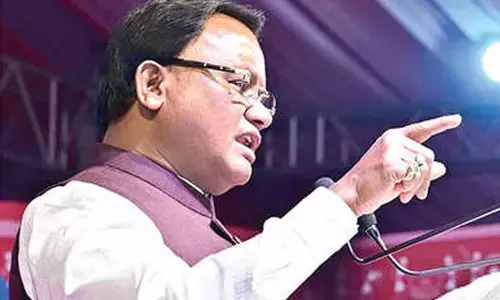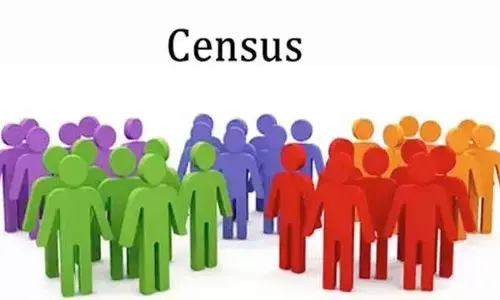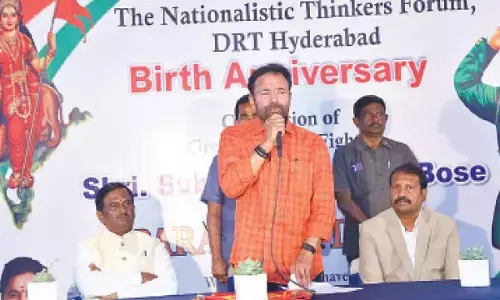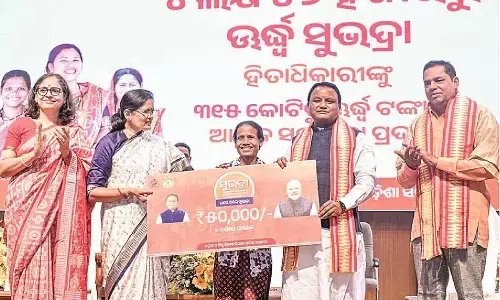Centre should clear stand
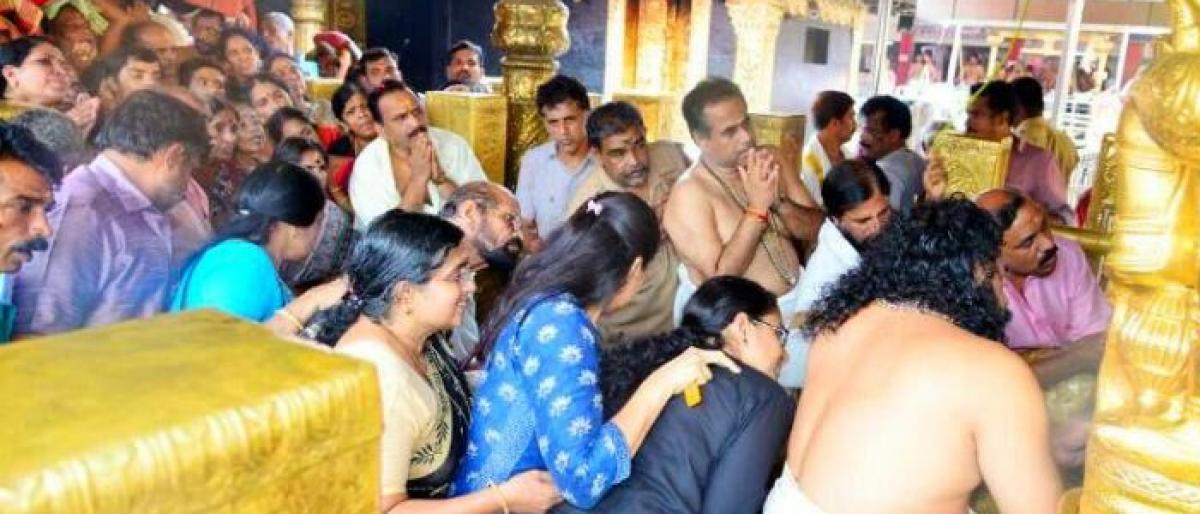
Following the recent Supreme Court judgement that women belonging to a particular age group should be permitted admittance to the Sabarimala temple, there have been disturbances at various places Unfortunately, political parties of different persuasions have taken varying stances on this religious practice issue, complicating the situation
Following the recent Supreme Court judgement that women belonging to a particular age group should be permitted admittance to the Sabarimala temple, there have been disturbances at various places. Unfortunately, political parties of different persuasions have taken varying stances on this religious practice issue, complicating the situation.
One might wonder why this restriction is in force in Sabarimala and not elsewhere. It is because of the ‘mandala deeksha’ consisting of various restrictions for a period of 40 days observed by devotees before they can have ‘darshan’ of Lord Ayyappa? Such devotees alone are entitled to climb up the sacred 18 steps which lead to the sanctum sanctorum.
And since, on account of biological reasons, certain age-group women cannot observe that 40-day protocol, they are not given the opportunity of climbing those steps. At present, men are permitted to have ‘darshan’ even without observing the 40-day protocol, although they are not allowed to climb the steps. Why this concession is not extended to women is not very clear.
Needless to say, no such custom is said to have been prescribed by God himself. Behind every such provision or religious requirement there is usually a framework of logic. While, as time passes, the logic may become unimportant, the custom survives, even if those subscribing are unable to explain the rationale any longer. An example is oft quoted to illustrate this.
There was a pet cat in a household. Whenever the annual ceremonies of departed souls were performed, the cat was tied up to a tree lest it touch the food stuffs which were part of the sacred ritual. A youngster who grew up watching the ritual continued to observe the ritual of tying up a borrowed cat, since they did not have a pet cat any more to the tree on death anniversaries. When asked why his response was that it was a custom in the family! It is precisely for the purpose of avoiding such irrational behaviour that religious heads are receptive to reforms over time.
Adi Shankara prostrated himself before a ‘chandala’ and authored the “Manisha Panchakam”. Ramanuja carried an untouchable over his shoulders into a temple in the name of ‘Muni Vahana Seva’. Hindu society, rather than shunning them on account of their acts, chose to follow the example of these reformers. One wishes that the Hindu priesthood, which is now adopting a stubborn stand, would explain to the devotees the rationale behind various customs, and then persuade them to follow their directions.
Time was when people belonging to the scheduled castes were denied admittance into temples. Subsequently social movements made the admission possible. In fact, today, there are even priests from those communities. Has God’s power diminished on that count? Can anyone accept that it has? As a matter of fact, not only persons belonging to the schedule castes, but even those of other religions are also visiting Tirupati. Has Lord Venkateswara‘s power suffered on that count? If it has, why are devotees visiting Tirumala in such large numbers, sometimes waiting for days together to have a darshan?
Reform is a continuous process, both social and religious. In the Islamic faith, for instance, there have been several changes in many countries. In Turkey Kamal Pasha did away with the Khalifa institution. Even in the fundamentalist environment of Saudi Arabia, forward-looking changes have taken place in recent times. The voice of liberalism has for long been prevalent in Indonesia. In Christianity the Church was supreme for a long time. It was even curbing scientific research in the name of religion. But now its influence has waned considerably and is having far less influence on the day today affairs of people in general.
In the Hindu religion also practices such as ‘Sati’ and child marriage have disappeared with the passage of time. And widow remarriage, which was seen by staunch Hindus as an evil that would destroy ‘dharma’, is no longer frowned upon, thanks to determined social reformers such as Veeresalingam in Andhra Pradesh. And the sky has not fallen up on our heads as a result of this departure from custom!
Customary and traditional practices created by Society are not on account of divine direction. What society accepts becomes what is expected by way of agreeable contact. Mankind is forever marching in the direction of change and progress. The youth, in particular, always have several reservations about adhering to the status quo and question it. Those who are unable to provide satisfactory answers take to the unfortunate alternative of suppressing their voice in the name of religion. It is only when the people asking questions by far outnumber the fundamentalists that the latter are forced to keep quiet. And a new regime of ethics is born.
Naturally enough, even the new regime is questioned with the passage of time and has to yield place to yet another dispensation which corresponds to the imperatives of the changing environment. All this is in keeping with the dynamics of social evolution. The main point to note is that reforms bring in change and progress without people having to give up faith altogether. As witness, for instance, the ever-increasing number of temples, mosques, churches, gurudwaras etc., their incomes and the number of devotees visiting.
The issue we need to look at is what the role of the government of the day is in a society that is changing in response to the demands from the environment. It must, of course, support, promote and assist any change that it regards as positive and likely to promote the welfare of people in general. This, in fact, is precisely what the British did during their time. Their government encouraged and supported the efforts of people such as Raja Ram Mohan Rai (who worked on for the eradication of the ‘sati’ practice) and, as mentioned earlier, Veeresalingam (in opposing child marriage). Thus, the government can also play a meaningful role in guiding society in the direction of taking informed decisions about what is good and what is not.
Unfortunately, after the advent of populism into politics, and governments are looking at the public as a vote bank rather than as people, and such responsibilities are being neglected. They are afraid to take sides between the fundamentalists on the one hand and the modernists on the other. They are quite happy to leave matters for the courts of law to decide, so that any repercussions will be directed towards the courts, rather than themselves. There is also the added advantage that litigation usually takes time and time, after all, is known to be a great healer! An excellent example of this attitude and its consequence is the case of the Ram Mandir at Ayodhya.
The point being made is that everything need not become a matter for courts to adjudicate upon - especially in religious issues. The government can facilitate a dialogue between the heads of important sects of a religion on any issue that is threatening to become controversial, and facilitate their reaching of a decision by consensus, through discussion and debate.
In sharp contrast is the attitude of the Modi government in matters such as ‘triple talaq’ – an attitude that has earned kudos from not only Muslim women but also liberal and activist quarters. That is an example of precisely what the government should do in such cases. If only it could show the same boldness and courage in respect of the Sabarimala issue, it would receive even greater encomiums.
Unfortunately, this is not happening. The BJP, as a political party, is fighting against the court’s verdict and asking the Kerala government not to act upon it. The government of India now needs to make it clear what its stand is. After all, it is not as though only those who are opposed to admitting women into the Sabarimala temple are devotees of the deity and those who favour it are not. Just as in the case of the ‘triple talaq’ issue, the Central government, and not the party in power, should make its stand unequivocal and clear.











